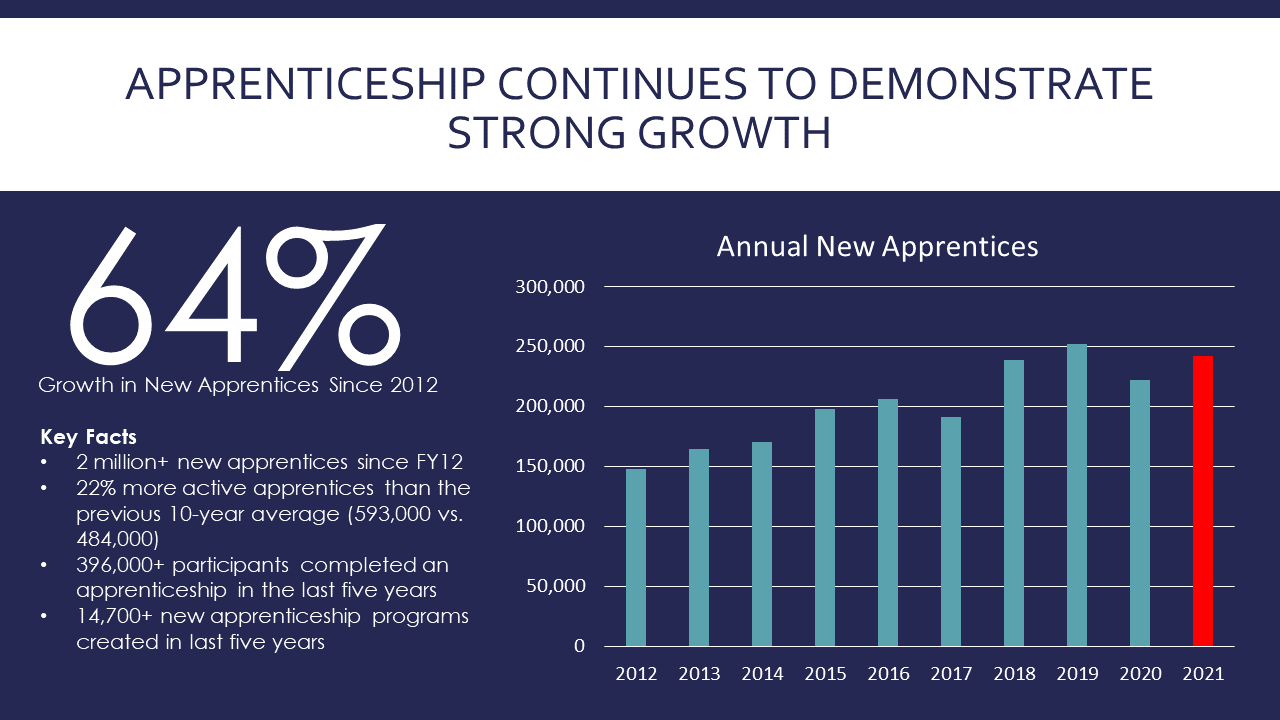With the construction industry looking for workers more than ever, the available opportunities are endless. One of the best ways to learn a skilled trade is to experience it firsthand. Every project has different complications, or methods of building, meaning workers must be adaptive to the project environment. One thing the classroom cannot teach you is how to handle the real world, but it can provide you tools on how to address things that may occur. Entering the construction and trades industry may seem daunting with the demographic differences and wide variety of jobs; but an apprenticeship can help guide anyone into the industry seamlessly, while also making a living wage.
An apprenticeship is defined as ‘an arrangement in which someone learns an art, trade, or job under another’. Many believe this is equivalent to an internship position, but it’s quite different. Apprenticeships are specified schooling ranging from 1-3 years on average depending on the trade, whereas an internship is an introduction to the workplace on an entry level over the course of a few months. Due to the shortness of an internship, pay is often excluded but could be replaced with college credit. Apprenticeships are paid positions as the program is typically paid for by the employer, or you yourself, and you are working in that trade outside of the program to gain hands-on experience. Unlike many internships, you will receive lots of 1-on-1 mentorship during an apprentice program and earn industry recognized credentials that carry for years after program completion.
Before applying to apprentice programs, you must be at least 18 years old and have a high school diploma, or a GED. This may deter some from applying at first, but that doesn’t always restrict you from working in the field. In fact, working in the field prior to enrolling in an apprenticeship can be a great opportunity to test out which trades you enjoy most before deciding on a specific one to study further. Students nowadays are heavily encouraged to attend 4-year universities following high school. Unfortunately, 30% of students drop out in the first year, and only 41% of students will graduate in the planned 4 years. Student loan debt is also the leading factor in the U.S. Debt for Education with a total of $1.75 trillion. It’s also important to note that only 33% of jobs require a 4-year degree. Many of the world’s trades can be self-taught and expanded into programs such as apprenticeships that ultimately offer free education, while also providing income.
Overall, there are two types of apprenticeships – registered and nonregistered. Registered apprenticeships (RAPs) are validated federally by the U.S. Department of Labor (USDOL) or by a local state agency. These programs have specific standards set by the USDOL or agency and offers governmental resources to promote networking to potential employers and other education programs. Nonregistered apprenticeships (IRAPs) do not have to register with the government, meaning they also don’t have to follow the governmental standards. However, many are accredited through organizations, such as NCCER, which has curricula that does meet USDOL standards. RAPs generally require around 2,000 hours or more of on-the-job learning along with 144 hours of classroom training, while IRAPs generally don’t have specific time requirements. However, both options are a great way to strengthen your knowledge and grow in your potential future career.
Apprenticeships are often offered through associations, many of which have ties to companies. Laux Construction, for example, is a member of the Greater Michigan Chapter of ABC (Association of Builders and Contractors). They have apprenticeship programs through the Greater Michigan Construction Academy (GMCA) which is accredited by NCCER. Two of our laborers, Joren Ruhf and Logan Melvin, are currently enrolled in the Carpentry Apprenticeship program, and both are doing phenomenal! Companies may also be located near colleges and universities that offer programs that would benefit their staff. Our Project Engineers here at Laux, Carter Vandlen and Ryan Dorey, are both currently enrolled at Lansing Community College pursuing Construction Management, while simultaneously using their in-class learning out in the field with us. The USDOL also recognizes our apprentices’ programs, which further helps them in growing their own personal networks for mentorship and connecting with peers!




Apprenticeships are a great way to be introduced to this industry and help navigate the vast number of possibilities for a career. No matter how old you are, these programs are offered to anyone willing to improve their current skills, or tack on new ones to their credentials. Good companies are more than willing to guide their employees toward opportunities that will not only benefit them but grow the person as an individual and worker. By helping build the confidence and skills of our staff, we are inherently building our company in the process with dedicated and passionate workers. Even better, we are helping this industry repopulate with new talent and people who appreciate hard work.
Share this Post


